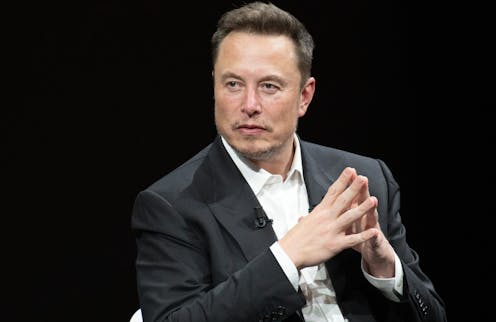Is Tesla’s sales slump down to Elon Musk?
- Written by James Obiegbu, Lecturer in Experiential Marketing and Management, Bournemouth University

Over the past couple of years, the seemingly steady rightward drift of Elon Musk[1] has culminated in actions and statements that have sparked broad controversy. Musk – visionary CEO of Tesla[2], SpaceX[3] and founder of X Corp – is a man on a mission to get humanity to Mars[4]. He is also the wealthiest person on the planet.
Most recently, these controversies include his endorsement and support of Germany’s far-right Alternative for Germany (AfD) party[5], gestures interpreted as a Nazi salute[6] during Donald Trump’s presidential inauguration and accusations of election interference[7].
In January, sales of Tesla cars slumped across five European countries[8] – the UK, France, Sweden, Norway and the Netherlands. Sales were down too in California – the US state with the largest car market. And according to at least one survey[9], Musk and his politics could be a significant part of the problem.
When CEOs are in the public eye, their personal brands and values, and those of the companies they represent, can be hard to separate. Our research has found that, often, human identity and reputation[10] will influence the CEO’s brand identity and reputation – and vice versa. As a human being, Musk’s personal actions and statements directly affect the companies he represents. His high-profile persona makes it difficult to separate the two.
This is why Musk’s controversial comments and political endorsements have alienated some Tesla consumers, particularly in progressive markets such as Europe and California. In these places, Tesla has historically been popular with environmentally aware consumers. When the profiles of a CEO and his or her brand are not aligned, it’s a problem that can undermine the brand value of both the CEO and the company.
Artists, politicians, CEOs and other public figures tend to attract fans whose personal values can at times deviate from those of the figurehead. Where this happens, devoted fans might be left at an impasse on how to respond to these figures or the products of companies or businesses they are associated with.
A common misconception is that smitten fans are too obsessed to express their distaste. Instead, they are likely to follow blindly and defend the actions of their heroes. Intense actions of “fan armies”[11] on social media platforms have not helped with these assumptions.
But in fact, our research has shown that devoted fans can be critical[12]. We found they are more likely than less devoted consumers to respond in extreme opposition when they feel betrayed by the behaviour of personalities they identify with or hold in high regard.
In the case of personalities like Musk, whose companies produce physical products, loyal fans and consumers could respond in a number of ways. A few hardcore Tesla fans and Musk loyalists might dismiss critiques against his behaviour as attacks against free speech or their own beliefs. They are likely to continue buying Teslas regardless – and may even adjust their own beliefs to align with those of their “hero”.
For other consumers, owning a Tesla may no longer signal purely their beliefs about sustainability. There may be a nod to political or ideological affiliations that do not align with their own.
Some consumers may want to dissociate with Tesla if Musk’s behaviour is seen as problematic in their social circle. However, as a purchase requiring high involvement and commitment, switching from Tesla to another EV might be difficult. The recent trend of Tesla owners placing apology stickers[13] on their vehicles is a way of negotiating the tension between owning a Tesla and the behaviour of the CEO they do not agree with.
The stickers provide a means of separating themselves from Musk’s actions while managing the fear of being perceived negatively within their social groups. This is likely to result in a gradual brand erosion rather than an immediate sales drop.
On the other hand, customers of companies such as craft beer brand BrewDog – a firm that has in the past been accused of fostering a culture of fear[14] – may be more responsive to bad CEO behaviour. They at least can switch to an alternative brand at little cost. (BrewDog, for its part, apologised and said it was “committed to doing better”[15].)
And if Remain voters dislike inventor James Dyson’s[16] stance on Brexit, they might be annoyed but still able to justify keeping a mid-value item like a vacuum cleaner (that is used privately in the home after all) until it breaks, perhaps switching for future purchases rather than abandoning outright.
Consumers can respond in a variety of ways when a figurehead CEO disappoints them. But brands taking blind, uncritical loyalty as a given – even from devoted fans – do so at their peril.
References
- ^ Elon Musk (theconversation.com)
- ^ Tesla (www.tesla.com)
- ^ SpaceX (www.spacex.com)
- ^ Mars (theconversation.com)
- ^ Alternative for Germany (AfD) party (news.sky.com)
- ^ interpreted as a Nazi salute (www.theguardian.com)
- ^ election interference (fortune.com)
- ^ five European countries (eu.usatoday.com)
- ^ one survey (www.electrifying.com)
- ^ human identity and reputation (www.emerald.com)
- ^ “fan armies” (www.businessinsider.com)
- ^ critical (www.emerald.com)
- ^ apology stickers (heatmap.news)
- ^ culture of fear (www.theguardian.com)
- ^ “committed to doing better” (www.theguardian.com)
- ^ James Dyson’s (www.reuters.com)
Read more https://theconversation.com/is-teslas-sales-slump-down-to-elon-musk-248727







